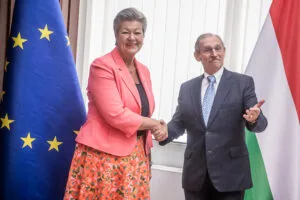Brussels – Barely a month has passed since Hungary took over the rotating presidency of the Council of the European Union, and already Budapest has created quite a few problems for the unity of the Union vis-à-vis Russia. Because after the “peace mission” of the Hungarian premier, Viktor Orbán, in visit to the Russian autocrat, Vladimir Putin, now Brussels is concerned about the potential hole that Budapest may create in the Schengen area, from which Russian and Belarusian spies could penetrate.

“I share the concerns expressed in recent days about the extension of the ‘National Card’ program to citizens of Russia and Belarus, which came into effect in the very first days of your presidency,” said European Commissioner for Home Affairs, Ylva Johansson, in a letter sent yesterday (Aug. 1) to Hungary’s Interior Minister, Sándor Pintér, in which she wanted to emphasize how “extending the facilitated processing of applications for residence and work permits of citizens of Russia and Belarus could lead to a de facto circumvention of restrictions imposed by the European Union.” At the center of the new contention between Orbán’s Hungary and the EU Commission is the extension to citizens of eight countries–it was previously available only to those of Serbia and Ukraine–of the National Card scheme, a fast-track visa system for entering the country and allowing people to work in Hungary’s national territory for up to two years. It is an easier system than a work permit or visa and it allows for family reunification.
“There are increasing reports of sabotage and attacks on our critical infrastructure and other hostile acts,” Commissioner Johansson recalls referring to the deployment of “every available tool to ensure the security of the Schengen area,” including the suspension of visa facilitation agreement with Russia in September 2022, and “higher standards of control and vigilance” for Russian nationals arriving at the Union’s external borders. Member states still have the competence to issue long-stay visas and residence permits. However, the EU executive notes that national programs “must be carefully balanced not to put at risk the integrity of our common area without internal border controls and to duly consider potential security implications.” She also spoke of the obligation of “loyal cooperation” and not to undermine “the useful effect of the provisions of Union law,” including Schengen. Within this framework, Hungary (and all EU member states) must ensure that “Russian nationals who could pose espionage or other security threats are subjected to the highest level of scrutiny.”

Therefore, Commissioner Johansson is asking the Hungarian minister to answer the questions attached to the letter by August 19 at the latest to shed light on the ‘National Card’ scheme and allow the EU executive to ascertain whether it is compatible with EU law or jeopardizes the overall functioning of the Schengen area. “The requirement to assess whether individuals crossing the external border pose a threat to public policy, internal security, public health, or international relations is a fundamental commitment of all Schengen members,” concludes the internal affairs commissioner. For Russia and Belarus, this also includes “the full and loyal application of EU restrictive measures on the prohibition of enter into or transit through the territories of member states by certain of its nationals.” As an extreme measure, the EU Commission could suspend the Schengen status of a (EU member) country, but it would be unprecedented.
English version by the Translation Service of Withub








